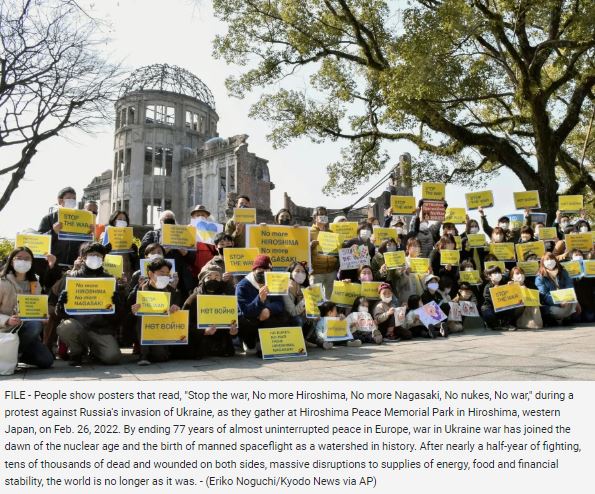Hiroshima bombing anniversary an apt time to endorse prohibition of nukes pact
Emeritus Professor Tan Sri Dato' Dzulkifli Abdul Razak
Opinion - New Straits Times
August 3, 2022
ON Aug 6, the anniversary of the Hiroshima bombing will be once again remembered followed by that of Nagasaki three days later.
In each case, we recall the horrors of a nuclear war, the only such war in the last 77 years, executed during World War 2 by the Allied Forces led by the United States.
As such, the 77th anniversary brings forward two distinct differences.
First, it is the first anniversary of the Treaty of Prohibition of Nuclear Weapons (TPNW) that came into force on Jan 22 last year.
It is the result of the ratification of the Treaty after 50 countries signed on to support it in October 2020.
Notwithstanding, not all is rosy. Five countries immediately issued a joint statement saying no to TPNW: "We will not support, sign or ratify this Treaty."
They also emphasised that it would not be "binding" on their countries.
This means that the prevailing risk of nuclear war has not only remained but could also be heightened. This was well illustrated when Ukraine was "invaded" by one of the five countries that issued the joint statement.
Although some would argue that the use of nuclear weapons is only "tactical", that is, selectively it matters.
The bombings of Hiroshima and Nagasaki could be said to be "tactical" as a form of deterrent.
But the destruction was far from selective. It caused an estimated 150,000 deaths in Hiroshima alone, and about half of that in Nagasaki.
The number of deaths is still being counted, never mind those who were maimed and traumatised for as long as they live.
Many more suffered radioactive effects across generations and suffered various forms of chronic cancer.
Pregnant women suffered a double tragedy when infants developed a myriad of impaired disabilities.
What is more, the two cities were deemed as undefended, with the majority of its inhabitants being innocent civilians.
Furthermore, Japan was reportedly about to surrender when the attack was launched, twice! Especially when that nuclear fallout was shown to be disastrous as never before in any war fought between so-called "civilised" nations.
Questions must then be asked about other "civilised" nations or groupings. After all, the implicated warring factions belong to entities almost similar in identity and culture compared with the Japanese and Asians more generally.
Still, the "uncivilised nature of the war cannot go unnoticed when "deterrent forces" (read, nuclear weapons) are said to be "combat ready" for the battlefield. Whether the deployment is "tactical" or otherwise, this is merely semantics.
As indicated by substantial evidence and reality on the ground, the incorporation of all types of weapons, including missiles, has caused innumerable harm.
It has also raised renewed fears as to where it would end.
And any escalation leading to a full-scale nuclear war cannot be totally discounted since a miscalculation is always a risky possibility in most aggressions.
At this juncture, the five countries' joint statement negating the TPNW comes to mind. It is not a coincidence that the majority of them, if not all, were involved directly or otherwise, in the "invasion".
Indeed, all nine de facto nuclear weapon countries have also refused to sign the TPNW.
This, therefore, makes the 77th sole atomic bombing tragedy a persuasive one in support of the TPNW. Moreover, it stands as the "most uncompromising regulation" on nuclear ambitions to date.
The other competing disarmament treaties are the Nuclear Non-Proliferation Treaty (1970) and the Comprehensive Nuclear Test Ban Treaty (1996).
Still, according to the Japanese foreign minister then in January: "The TPNW is an important treaty that can be described as an exit to a world without nuclear weapons."
Coming from Japan, the only country that was subjected to nuclear offensives, brings the point home.
Therefore, efforts to educate the policymakers and implementers globally is imperative in ensuring that the basic principles and norms of the TPNW are properly understood and translated.
The focus falls on the younger generation, who, in 2015, were recognised by the UN Security Council "to play an important and positive role in the maintenance and promotion of international peace and security".
By putting it in the framework of Sustainable Development Goals, especially SDG 16 and 17, the chances of translating the TPNW into a reality are brighter.
The writer, an NST columnist for more than 20 years, is International Islamic University Malaysia rector

